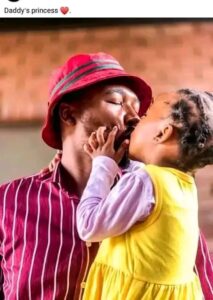
A South African man recently shared a deeply painful and emotional moment of his life, revealing that the child he had always believed to be his biological daughter was, in fact, not his. This shocking discovery has sparked mixed reactions across social media platforms, where photos of the father and daughter have been circulating.
The devastating news cam
 e after the man received the results of a DNA test, confirming that he was not the biological father of the girl he had loved and cared for as his own. This revelation shattered the bond he believed they had, leaving him heartbroken and grappling with the emotional consequences.
e after the man received the results of a DNA test, confirming that he was not the biological father of the girl he had loved and cared for as his own. This revelation shattered the bond he believed they had, leaving him heartbroken and grappling with the emotional consequences.
The situation raises difficult questions about the nature of fatherhood and the role of biology in parent-child relationships. Many people have weighed in on social media, with some expressing sympathy for the man, while others debated the impact of such a revelation on the bond between a father and child.
“How would you feel if you found out your child isn’t biologically yours?” is a question that has emerged in these discussions. The emotional turmoil and sense of betrayal that can accompany such news is unimaginable for many. For some, the realization that a child they’ve nurtured and loved is not biologically theirs could feel like a loss, while others argue that biology doesn’t define true fatherhood.
A crucial aspect of the conversation revolves around whether a non-biological father can still maintain a meaningful relationship with the child after such a discovery. While the DNA results may challenge the biological connection, many argue that the emotional bond built through years of care, support, and love cannot be easily broken.
In cases like these, some men choose to remain in the child’s life, recognizing that fatherhood extends beyond bloodlines. Others may struggle to reconcile their feelings of betrayal and decide to distance themselves. Ultimately, the decision varies based on individual circumstances and emotional capacities.

This heartbreaking story sheds light on the complex nature of family relationships and the importance of love, trust, and communication in navigating such painful revelations.




